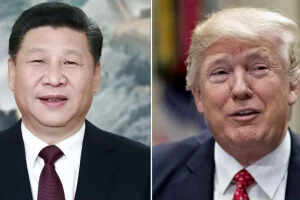Is China Set to Become the New Economic Leader Amidst Trump's Trade Chaos?
The Shift in Global Economic Dynamics
 US President Donald Trump's controversial tariff policies have disrupted the global trade landscape, leading to a potential shift in economic power towards China. As President Xi Jinping embarks on a diplomatic tour of Vietnam, Malaysia, and Cambodia, it becomes evident that China is strategically positioning itself to take advantage of the current turmoil. The recent imposition of tariffs by the US on April 2 has only solidified China's determination to redefine its international economic strategy, which may prove to be more impactful than its Belt and Road Initiative. Trump's aggressive trade tactics have inadvertently encouraged China to reduce its reliance on the US, fostering a new economic dynamic that could lead to a separation of the two largest economies, a scenario that once seemed unlikely.
US President Donald Trump's controversial tariff policies have disrupted the global trade landscape, leading to a potential shift in economic power towards China. As President Xi Jinping embarks on a diplomatic tour of Vietnam, Malaysia, and Cambodia, it becomes evident that China is strategically positioning itself to take advantage of the current turmoil. The recent imposition of tariffs by the US on April 2 has only solidified China's determination to redefine its international economic strategy, which may prove to be more impactful than its Belt and Road Initiative. Trump's aggressive trade tactics have inadvertently encouraged China to reduce its reliance on the US, fostering a new economic dynamic that could lead to a separation of the two largest economies, a scenario that once seemed unlikely.
The global community, including China, is increasingly aware of the vulnerabilities associated with dependence on the American market. This realization has prompted various nations to explore alternative markets to mitigate their reliance on US consumers.
Xi Jinping's visit to Southeast Asia, following the escalation of Trump's tariff war, underscores China's intent to forge stronger economic ties with more dependable partners. This strategy also encompasses the European Union and other emerging economies. Notably, Brazil has overtaken the US as China's primary supplier of agricultural goods, highlighting the shift in trade relationships. As the US imposes tariffs, affected countries are compelled to seek new trading partners.
While Trump often touts the term 'smart,' his actions appear counterproductive, as they contribute to a global trend of nations seeking to circumvent US influence. This significant realignment extends beyond trade; it reflects Washington's retreat from international organizations and its growing disdain for established global norms and alliances, including its support for Ukraine against Russian aggression.
China is likely to welcome the US's diminishing soft power, which was once a cornerstone of its foreign policy. A case in point is the abrupt closure of Radio Free Asia, which played a crucial role in informing the oppressed Uyghur community in China. By signaling a retreat, whether due to exhaustion or other factors, the US is inadvertently creating a vacuum that China is eager to fill.
Since the onset of Trump's second term, Beijing has been positioning itself as a moral successor on the global stage. However, if China achieves its ambitions, it may not bode well for nations like India, considering China's history of resource exploitation in Africa and beyond. Furthermore, China's trade policies aim to offload surplus production, which poses a threat to employment in Europe and various Asian countries. Xi's poor human rights record remains a significant barrier for many democracies, including those in Europe. While compromises with Beijing may seem necessary to counter American instability, China is a questionable ally, a fact well understood by India.
